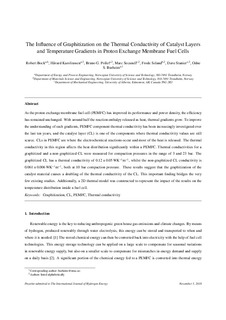The influence of graphitization on the thermal conductivity of catalyst layers and temperature gradients in proton exchange membrane fuel cells
Bock, Robert; Karoliussen, Håvard; Pollet, Bruno; Secanell, Marc; Seland, Frode; Stanier, Dave; Burheim, Odne Stokke
Journal article, Peer reviewed
Accepted version
Permanent lenke
http://hdl.handle.net/11250/2580888Utgivelsesdato
2018Metadata
Vis full innførselSamlinger
Sammendrag
As the proton exchange membrane fuel cell (PEMFC) has improved its performance and power density, the efficiency has remained unchanged. With around half the reaction enthalpy released as heat, thermal gradients grow. To improve the understanding of such gradients, PEMFC component thermal conductivity has been increasingly investigated over the last ten years, and the catalyst layer (CL) is one of the components where thermal conductivity values are still scarce. CLs in PEMFC are where the electrochemical reactions occur and most of the heat is released. The thermal conductivity in this region affects the heat distribution significantly within a PEMFC. Thermal conductivities for a graphitized and a non-graphitized CL were measured for compaction pressures in the range of 3 and 23 bar. The graphitized CL has a thermal conductivity of 0.12 ± 0.05 WK–1m–1, whilst the non-graphitized CL conductivity is 0.061 ± 0.006 WK–1m–1, both at 10 bar compaction pressure. These results suggest that the graphitization of the catalyst material causes a doubling of the thermal conductivity of the CL. This important finding bridges the very few existing studies. Additionally, a 2D thermal model was constructed to represent the impact of the results on the temperature distribution inside a fuel cell.

